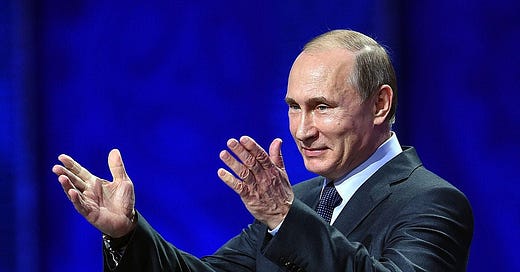Good morning. Rachel Reeves will set out her economic vision at the Mais lecture this evening. More on that tomorrow. Today I ask whether anything will change between now and the election. I’ve got some bad news.
Then, Bruno on Vladimir Putin’s election victory in Russia. It reveals not his popularity, but the extent of his control over the country. You can get the full Morning Call by clicking this button:
The shadow cabinet, I gather, has been told to fashion its policy briefs into as many press releases, speeches, attack lines and titbits of repartee as possible. The aim is to create a stockpile for the long, slow march towards the election. Labour’s hope that it will be in May has morphed into a begrudging shrug that perhaps No 10 will play the long game. There is some concern that holding the party in a battle-ready crouch could produce burnout among officials and campaigners. Others in the party no longer see by-elections as opportunities to flex electoral muscles and test out attack lines, but a distraction from the 650 individual contests Labour must fight in the general election.
Labour’s strategy makes sense when you realise the months leading up to the next election will be a monotonous slog. Little is likely to change. It’s becoming increasingly clear that the Conservatives are not going to pull an election-saving rabbit out of their hat (the 4p cut to National Insurance has made no perceptible difference in polls). The only hope for them lies in painting Labour as untrustworthy at a time when the economy is recovering.
That means the level of debate is going to be low. Shoots of ideological disagreement are quickly smothered by Westminster gossip and intrigue. The fact that No 10 needs to keep Tory MPs in line means speculation over the date of the election will continue. Such rumours will overshadow any message that Downing Street wants to get across.
The second thing that will crowd out No 10’s pitch to the public is the shadow Tory leadership contest that is increasingly being fought in public. Ambitious cabinet ministers are reportedly tarnishing their opponents by briefing that they are plotting to replace Rishi Sunak. Penny Mordaunt was supposedly the victim of such a strategy over the weekend. Whenever this happens, the inevitable counter briefing follows, relegating what the Prime Minister wants to talk about to page seven.
No 10’s limp grip on the narrative was exposed when the Budget was quickly drowned out by Tory infighting, Lee Anderson’s defection and party donor Frank Hester’s comments about Diane Abbott. A “Business Connect” event yesterday was only memorable because Kemi Badenoch and the PM jostled to play host. “Whether colleagues are happy with him or not, it’s too late, right. Get on with it,” said the former defence secretary Ben Wallace, in what cannot be seen as a stirring vote of confidence.
Politics will snake towards the election through an obstacle course of briefings, bitterness and shallow debate. Labour sounds unlikely to announce much more policy, aware that the Tories could snatch their plans as they did with the non-dom tax. That means much of the planning will happen behind the scenes; speeches will be scoured for clues as to what Labour would do in government. The opposition wants the election to be a referendum on the Tories’ 14-year rule. The Tories want it to be about Labour. The result could be limited, defensive splashes of policy designed to catch out the enemy, but little substantive debate about their respective visions for the next five years.
Freddie’s picks
American lawmakers are trying to force ByteDance to sell TikTok to a non-Chinese company. If they don’t, it will be banned. Sarah Manavis explains why the strategy will not help us.
“Seen from the West Bank, a two-state solution remains a chimera.” Megan reports on settler violence and why Israel won’t solve the problem in this despatch from the West Bank.
Can we cheat death? Anjana Ahuja reviews a new book on the science behind anti-ageing.
Only violence rules Russia
It seemed puzzling at first that so many were talking about the Russian election when the results were announced on Sunday (17 March). At that point, I still did not know who the other candidates were, and now it seems pointless to type the question into a search engine. Vladimir Putin won with nearly 88 per cent of the vote. There was never much question this would happen. Anything less would raise questions about where exactly might those votes be going and why.
Putin made sure that would not happen by imprisoning, exiling or assassinating every opposition figure and by sending the police and the army around the country with instructions to help prevent surprises. Nevertheless, every Western mainstream media still chose to speak of an election and to give it pride of place on their newscasts, web pages and print editions. Why?
Click through to the NS to read the rest, or MC subscribers can read in full in-email.
Keep reading with a 7-day free trial
Subscribe to Morning Call to keep reading this post and get 7 days of free access to the full post archives.








